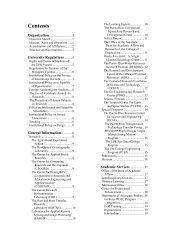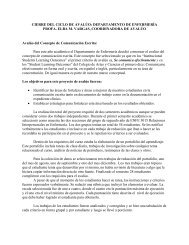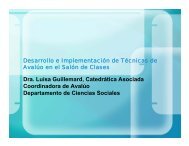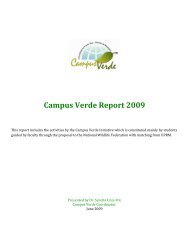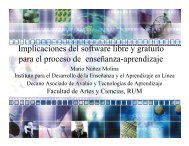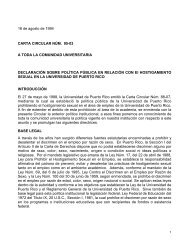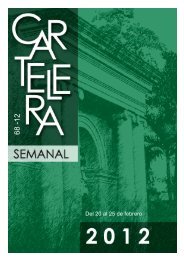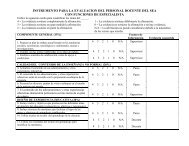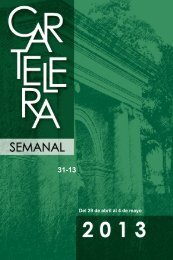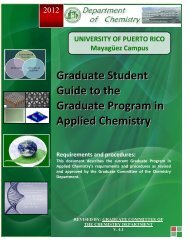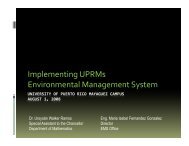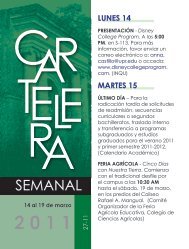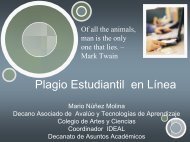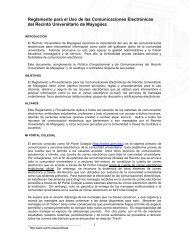Undergraduate Catalogue - UPRM
Undergraduate Catalogue - UPRM
Undergraduate Catalogue - UPRM
Create successful ePaper yourself
Turn your PDF publications into a flip-book with our unique Google optimized e-Paper software.
COLLEGE OF ARTS AND SCIENCES<br />
VIVIAN NAVAS, Professor, Ph.D., 1990, University<br />
of Illinois at Urbana, Illinois.<br />
CARLOS A. PEREZ-MUÑOZ, Professor, Ph.D.,<br />
1991, University of California, Davis.<br />
CARMEN T. PORRATA, Professor, M.S., 1972,<br />
University of Puerto Rico.<br />
CARLOS RIOS-VELAZQUEZ, Assistant Professor,<br />
Ph.D., 2000, University of Wisconsin, Madison.<br />
ILEANA RIVERA, Associate Professor, M.S., 1974,<br />
University of Puerto Rico.<br />
JUAN A. RIVERO, Distinguished Professor, Ph.D.,<br />
1953, Harvard University.<br />
ALEJANDRO RUIZ-ACEVEDO, Professor, Ph.D.,<br />
1981, University of Oklahoma.<br />
ROSA J. SANTIAGO, Professor, M.S., 1963,<br />
University of Puerto Rico.<br />
CARLOS J. SANTOS, Assistant Professor, Ph.D.,<br />
2001, University of Wisconsin, Madison.<br />
INES SASTRE-DE JESUS, Professor, Ph.D., 1987,<br />
City University of New York.<br />
RICHARD D. SQUIRE, Professor, Ph.D., 1969,<br />
North Carolina State University.<br />
JOHN M. USCIAN, Associate Professor, Ph.D.,<br />
1994, University of Nebraska-Lincoln.<br />
MARIA M. VARGAS, Associate Professor, Ph.D.<br />
1997, Arizona State University.<br />
ANA V. VELEZ, Instructor, M.S., 1994, University<br />
of Puerto Rico.<br />
COURSES OF INSTRUCTION<br />
<strong>Undergraduate</strong> Courses<br />
CIBI 3031. INTRODUCTION TO THE<br />
BIOLOGICAL SCIENCES I. Three credit hours.<br />
Two hours of lecture and one two-hour laboratory<br />
per week.<br />
Fundamental biological principles as inferred by<br />
studying the varieties of living organisms and their<br />
relationships. Topics include: the scientific<br />
method; the chemistry, structure, and function of<br />
cells; the processes of digestion, circulation,<br />
immunological response, respiration, and excretion.<br />
CIBI 3032. INTRODUCTION TO THE<br />
BIOLOGICAL SCIENCES II. Three credit hours.<br />
Two hours of lecture and one two-hour laboratory<br />
per week. Prerequisite: CIBI 3001 or CIBI 3031.<br />
Fundamental biological principles as inferred by<br />
studying the varieties of living organisms and their<br />
relationships. Topics include: the nervous system<br />
and the senses, the muscular system, the skeletal<br />
system, hormones, reproduction and development,<br />
genetics, and evolution.<br />
BIOL 3010. CELL PHYSIOLOGY. Three credit<br />
hours. Two hours of lecture and one three-hour<br />
laboratory per week. Prerequisite: QUIM 3031 or<br />
QUIM 3461.<br />
Study of the structure and function of life<br />
molecules at the cell level, and the interactions<br />
among them.<br />
BIOL 3021-3022. ANIMAL BIOLOGY. Three<br />
credit hours per semester. Two hours of lecture and<br />
one three-hour laboratory per week each semester.<br />
A survey of the animal kingdom, fundamental<br />
principles of animal biology, and the uses of the<br />
microscope. Structure, functions, habitat, and<br />
economic importance of representative groups of<br />
animals will be studied in detail. First semester:<br />
the nonchordate animals; Second semester: the<br />
chordates.<br />
BIOL 3051-3052. GENERAL BIOLOGY I-II.<br />
Four credit hours per semester. Three hours of<br />
lecture and one three-hour laboratory per week.<br />
Study of the diversity of organisms, the<br />
relationships between them and their environment,<br />
the fundamental aspects of their structure and<br />
function, and the processes that regulate the<br />
perpetuation of life.<br />
<strong>Undergraduate</strong> <strong>Catalogue</strong> 2004-2005 115



